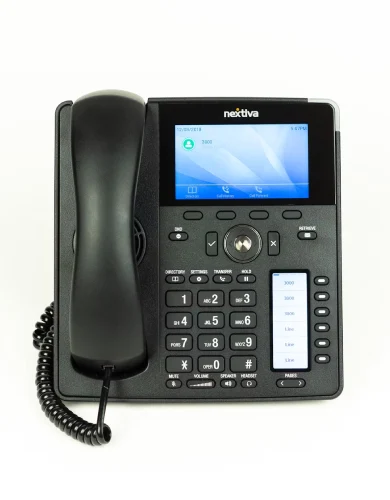VoIP vs UCaaS
For UK businesses, having a dedicated 01, 02, 03, or 0800 landline number is essential, as it legitimises your business for sales, customer support, or general enquiries.
However, with the impending PSTN Switch Off many businesses are turning to VoIP, leaving them with two options: standard business VoIP phone systems or more comprehensive UCaaS solutions. This article explores the key differences between business VoIP and UCaaS, using examples to help you decide which solution may be most appropriate for your needs.
Contents
- What is UCaaS?
- UCaaS vs VoIP phone systems
- What is best for my business: UCaaS or VoIP?
- Plug-and-play UCaaS
- The future of UCaaS and VoIP
What is UCaaS?
UCaaS (Unified Communications as a Service) is any cloud-based platform that unifies various communication and collaboration tools such as video conferencing, team messaging, file sharing, and collaborative workspaces alongside VoIP (Voice over Internet Protocol).
The VoIP phone system is at the core of UCaaS, but its added functionality enables organisations to manage all communication within one seamless environment. This makes it easy to switch between channels and maintain consistency across teams and departments.
Examples of UCaaS
Some of the most popular examples of UCaaS platforms include:
- Microsoft Teams (with Phone System)
- Zoom (with Zoom phone)
- RingCentral
- Cisco Webex
- Google Workspace
- 8×8 X Series
- Vonage Business Communications
If you work for a medium to large organisation in the UK, you are almost certainly using one of these solutions.
UCaaS vs collaborative platforms
Cloud-based solutions are constantly evolving, and their features increasingly overlap. UCaaS and collaborative platforms like Google Workspace are prime examples of this trend.
Google Workspace is arguably one of the best cloud-based business environments. It offers tools commonly found in UCaaS, such as file sharing (Google Drive), collaborative environments (Google Docs and Sheets), and messaging (Google Chat and Gmail). It even provides one of the most popular device-to-device VoIP solutions with Google Meet.
However, it is not UCaaS because it lacks a business phone line solution that supports PSTN numbers (01, 02, 03, or 0800), making it unsuitable as a business public point of contact.
While Google Workspace can integrate with Google Voice in the US (Google’s business landline VoIP solution), this service is not currently supported in the UK.
UCaaS vs VoIP phone systems
UCaaS is essentially a business VoIP phone system with added functionality.
It includes all the features of a standard business VoIP system:
- Supports UK virtual landline numbers (01, 02, 03, or 0800)
- Enables VoIP phones, headsets, or adaptors
- Provides call management features (e.g., routing, forwarding, virtual receptionists)
In addition, UCaaS platforms offer a suite of collaborative and communication tools, including messaging, file sharing, and collaborative spaces for documents, spreadsheets, and design canvases.
We recommend our expert guide on how business VoIP works.
What is best for my business: UCaaS or VoIP?
Both UCaaS and business VoIP are tailored to meet different business needs.
Business VoIP system providers offer a more streamlined and affordable solution for businesses that primarily require phone call capabilities with landline number support.
Other business needs, such as collaboration and messaging, can be met through separate platforms like Google Workspace, Notion, or WhatsApp without the need for full integration.
On the other hand, UCaaS offers a comprehensive, centralised solution ideal for businesses that need seamless coordination across multiple departments. This centralisation provides the consistency necessary for managing complex operations at scale.
To illustrate, here’s a table showing examples of typical businesses and why they might choose one solution over the other:
| Business type | Solution choice | Reason |
|---|---|---|
| Small local businesses | VoIP | Ideal for businesses such as small retailers, cafes, or independent service providers. VoIP lets them keep a professional image and provide basic features like voicemail-to-email over a simple small business broadband connection. |
| Small customer service and call centres | VoIP | Best for smaller call centres or customer service teams (e.g., local insurance agents, small retail customer support) where basic call handling and routing are needed without multi-channel or analytical capabilities. Find out more in our guide to small business VoIP. |
| Freelancers and startups | VoIP | Cost-effective for solo entrepreneurs, consultants, and small startups needing simple voice communication with the flexibility to add other tools as they grow. |
| Large customer service and call centres | UCaaS | Larger operations, such as national customer service centres or tech support call centres, benefit from UCaaS for unified call routing, video support for complex queries, and integrated messaging. |
| Remote and hybrid teams | UCaaS | Distributed teams (e.g., consulting firms, remote dev teams) gain multi-channel communication and collaboration, allowing seamless switching between voice, video, and messaging. Unlikely to need VoIP phones. Find out more in our guide to remote VoIP solutions. |
| Medium to large enterprises/institutions | UCaaS | Ideal for complex organisations, such as financial institutions, manufacturing firms, and universities, where cross-department workflows and integrated communication are essential. |
| Technology and marketing agencies | UCaaS | Agencies handling collaborative projects benefit from UCaaS for video, messaging, and file sharing, which are crucial for project management and seamless internal/external communication. |
Plug-and-play UCaaS
The beauty of cloud-based solutions is their flexibility, enabling businesses to switch or scale solutions easily. In this context, choosing VoIP over UCaaS (or vice versa) doesn’t mean committing to one forever.
Many providers offer modular plans, allowing businesses to scale up, down, or across as their communication needs evolve. Since VoIP phone systems are a foundational part of UCaaS, businesses can begin with standard VoIP features and later add UCaaS features or even simplify back to VoIP if required.
Here are a few practical examples of how this flexibility works within leading solutions:
| Solution | Description | Cost range (per user per month) |
|---|---|---|
| RingCentral | Comprehensive platform with VoIP, video, messaging, and team collaboration tools; easy to upgrade from VoIP to UCaaS as business needs expand. | VoIP: £9.99+ UCaaS: £15.00–£25.00 |
| 8x8 X Series | Modular solution with VoIP, video, messaging, and VoIP analytics; switch from VoIP to full UCaaS smoothly as needs grow, ideal for customer support. | VoIP: £12.00+ UCaaS: £20.00–£40.00 |
| Microsoft Teams (with Phone System) | Adds VoIP to Microsoft Teams, transforming it into a UCaaS solution; businesses using Microsoft 365 can easily add or remove VoIP as needed. | VoIP: £10.00+ UCaaS: £17.00–£30.00 |
| Zoom (with Zoom Phone) | Primarily a video platform, with optional VoIP for a full UCaaS setup; simple to move from video-only to UCaaS by adding Zoom Phone. | VoIP: £8.50+ UCaaS: £17.00–£30.00 |
| Vonage Business Communications | VoIP-first with options to add UCaaS features like messaging, video, and VoIP integrations; flexible and straightforward to upgrade to UCaaS. | VoIP: £9.00+ UCaaS: £15.00–£30.00 |
| Zoom (with Zoom Phone) | Primarily a video platform, with optional VoIP for a full UCaaS setup; simple to move from video-only to UCaaS by adding Zoom Phone. | VoIP: £8.50+ UCaaS: £17.00–£30.00 |
| Vonage Business Communications | VoIP-first with options to add UCaaS features like messaging, video, and CRM integrations; flexible and straightforward to upgrade to UCaaS. | VoIP: £9.00+ UCaaS: £15.00–£30.00 |
The future of UCaaS and VoIP
Cloud-based software-as-a-service is like a Wild West; it’s rapidly evolving, with new solutions frequently emerging, merging, or being integrated into larger platforms. But a trend emerges from the chaos: communication tools converge into unified, all-in-one platforms.
For businesses considering these advanced solutions, understanding business VoIP costs can provide valuable insight into planning for these transitions and finding cost-effective communication options.
In the coming years, the term UCaaS may disappear altogether as tech giants like Google and Meta seamlessly incorporate VoIP capabilities.
Many regions outside the UK have already seen a shift to device-to-device platforms like WhatsApp rather than traditional landlines. Our experts believe it’s only a matter of time before UK businesses follow suit.
UCaaS vs VoIP – FAQs
Our experts answer frequently asked questions regarding UCaaS and its differences with business VoIP:
How reliable is VoIP compared to UCaaS?
VoIP and UCaaS are equally reliable for voice communication because VoIP is part of any UCaaS platform.
In either case, reliability depends more on the speed and latency of your business broadband deal, the efficiency of your local area network, and the quality of your cloud-based VoIP or UCaaS solution.
Is UCaaS secure?
Yes, UCaaS is generally secure when provided by reputable vendors. Most UCaaS platforms offer end-to-end encryption, multi-factor authentication (MFA), and compliance with data regulations like DPA 2018.
Providers also use secure, compliant data centres and real-time threat monitoring to detect threats.
Find out more in our complete guide to business VoIP security.

